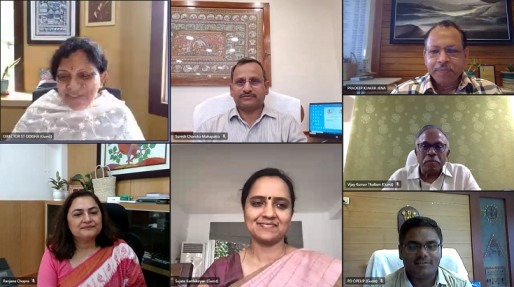Bhubaneswar: In a major step towards climate change action plan, the Odisha Government has decided to promote climate resilient natural farming through women self- help groups (WSHGs) of Mission Shakti.
The State Government has come up with the programme to boost natural farming for eco-biology and a sustainable future.
A memorandum of Agreement (MoA) to this effect was signed among the departments of Scheduled Tribe, Scheduled Caste and Minorities Development, Mission Shakti, and RYSS of Andhra Pradesh in a virtual meeting held under the Chairmanship of Chief Secretary Suresh Chandra Mahapatra from the Lok Seba Bhawan.
The Chief Secretary directed concerned departments to have robust “field level convergence for successful implementation of the programme”.
Emphasizing on inevitability of natural farming for eco-biology and sustainable future, he said, “Natural farming will get popular acceptance among the people, more particularly in tribal dominated districts of Odisha as the method is quite compatible with the traditional patterns. The method while reducing the cost of production will also usher in production of safe and nutritious food items.”
The agreement was signed by T Vijaya Kumar, Advisor to Government of Andhra Pradesh on Agriculture and Cooperation, and Executive Vice-Chairman of RYSS; Principal Secretary ST SC and Minority Development Ranjana Chopra; and Sujata R. Karthikeyan, Secretary Mission Shakti Odisha.
Development Commissioner Pradeep Kumar Jena said, “Natural farming while changing the cropping scenario of Odisha will lead to a transformational change towards sustainability”.
Jena added, “As the popularity of non-toxic food items is on high demand, natural farming will fetch more income to WSHGs.”
MoA was signed to start the programme in tribal dominated areas in collaboration with RYSS of Andhra Pardesh who would provide knowledge support with its rich experience from Andhra Pradesh.
Outlining basic objectives of the programme, Chopra said, “Natural farming transition programme will be implemented in tribal dominated areas of 5 districts namely Sundargarh, Keonjhar, Mayurbhanj, Rayagada and Koraput”. The project would be rolled out in the operational area from the FY of 2022-23.
Chopra added that the programme would be implemented in convergence with Mission Shakti department through the members of 13,500 WSHGs. A total area of around 3.15 lakh hectors of farm land would be taken up under the programme. Cluster approach would be adopted for implementation. Each cluster would consist of 50 WSHGs. An amount of around Rs.311.93 cr would be invested over five years in the programme.
Mission Shakti Secretary Sujata R. Karthikeyan said, “Women in tribal dominated areas of the State are quite conversant with agricultural practices. They form an integral part of the agricultural operations. They will be happy to carry forward the programme of natural farming considering its benefits both for their family in particular and society in general.”
Director ST, SC and Minority Development Guha Poonam T Kumar said that the WSHGs would be trained to act as resource persons, and they would be assisted for crop diversification, initial preparation of bio-inputs, pre monsoon sowing, establishment of common facility centers for cleaning, grading, segregation, storage etc. Each WSHG would also be supported for developing Poshan Garden.
The Project officers of Integrated Tribal Development Societies of concerned districts along with senior officers from Mission Shakti and Odisha Tribal Development Society participated in the discussions.


Comments are closed.